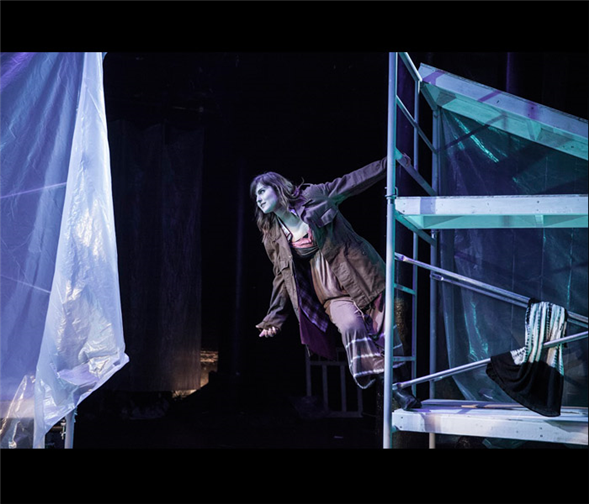Translate Page

This season, actresses liberate themselves via playwriting
---
If you're an actor seeking a great role, then you may want to write it yourself. Just ask performer-turned-playwright Nandita Shenoy. "I started writing initially because I just found the roles that I was auditioning for so uninspiring," she says.
Because she's of Indian descent, the sides Shenoy received usually asked for an accent. "I rarely auditioned with an American accent," she recalls. "And for whatever reason, I was very often asked to portray someone who was 30-40 years older than I was."
So when she wrote her play Washer/Dryer, Shenoy created a heroine named Sonia who was everything the actress rarely got to play: "a fast talking, sassy South-Asian woman." A comedy about a pair of newlyweds living in a co-op in New York City, the show ran in Los Angeles and Chicago before enjoying a well-received Off-Broadway run from Ma-Yi Theater Company earlier this year. (Shenoy herself played Sonia in the Ma-Yi production.)
Shenoy is not the first actress this season to turn to playwriting to create robust characters for women. Walking Dead actress Danai Gurira has spoken frequently about how the lack of leading, multifaceted roles for African women led her to write Eclipsed, currently running on Broadway. Meanwhile, performance artist Heather Litteer was tired of always playing prostitutes in Hollywood films, so she decided to create a one-woman show about it, which ran at La MaMa this spring.
This momentum is not letting up. For actress Erika Phoebus, the desire to write her first play, Kiss It, Make It Better also came out of frustration. "Women my age were coming out with all of these stories of sexual assault that's been repressed," she recalls. And though assault and rape culture have been making headlines with increasing frequency, Phoebus realized that onstage, the stories told about rape victims lacked dimension and follow-through. "I felt like everything was kind of pigeonholed. You never saw what happened to these human beings afterwards and how they continue to live their lives. There's more to talk about with all of that."
So in Kiss It, Make It Better, Phoebus dives deeply into the psyche of a teenager named Nadia who is assaulted by an older man. The assault happens early on – and is not shown to the audience – leaving the rest of the play to explore how that event affects the way the heroine communicates with the people she loves and how she understands sex and desire. (The show is running through June 18 at the New Ohio, produced by Theatre 4the People.)
For Phoebus, playing the character herself was an integral part of the writing process. "Before I started putting other people through it," she says, "there were things that I wrote that my subconscious really wanted to be able to live out and work through and express and share from my own heartbeat."
Shenoy took the opposite approach, waiting to play Sonia until the Ma-Yi production, well after the script was solidified. While it was a joy to embody a well-rounded female character, being a creator also made her more confident about her career.
"I think actors often are not encouraged to be more than actors," she says. "Once I started writing, I didn't feel like [acting was] my only opportunity to be creative. I can go home and be creative on my own. I don't need permission."
Shenoy hopes that plays like hers can correct how female characters are often depicted throughout the industry. "The thing that has struck me over the years is how much less women speak and how so much of the action of a play is based around male desires, rather than female desires," she says. "I'm trying very purposefully to write what I call 'female-forward plays' and offer opportunities for women to control the storylines. [I want] women's needs and desires to be driving the story and driving the plot, rather than reacting to what men want."
To that end, she is currently working on Satisfaction, a play about a group of women trying to find sexual release. Ma-Yi will host a reading as part of its Summer Labfest on June 11.
What actresses like Shenoy and Phoebus prove is that you don't always have to wait for a playwright or director to give you the role that you want. "It's completely doable and so deeply fulfilling," says Phoebus. "I've never felt anything like the way I've been feeling doing this. Everyone should make their own work. Tell your story. People will listen."
---
Follow Diep Tran at @DiepThought. Follow TDF at @TDFNYC.
Top photo – of Erika Phoebus in Kiss It, Make It Better – by Yvonne Alloway. Photo from Washer/Dryer by Isaiah Tanenbaum.
TDF Members: Go here to browse our current discounts for theatre, dance, and concerts.